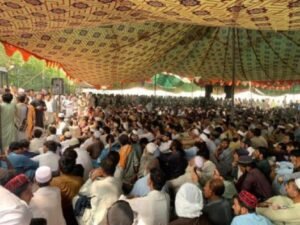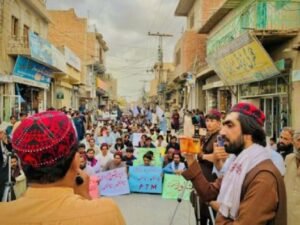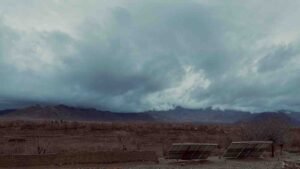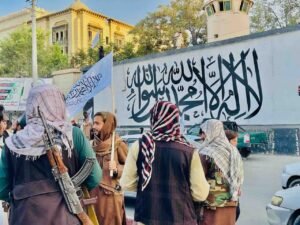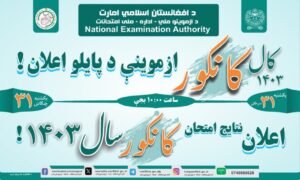Defying the Odds: Pakistanis Quest Against Pakistan Army for Real Democracy

Islamabad, Pakistan. Photo: @Ali Ahmad
By A. Shafaq
In a startling turn of events, the recent parliamentary elections in Pakistan have ignited a firestorm of political upheaval, fundamentally altering the nation’s political landscape in ways previously unforeseen. Despite being pushed to the corner and facing unimaginable challenge, including the imprisonment of its senior leaders including the charismatic Imran Khan and the erasure of its election symbol, the Pakistan Tehreek-e-Insaf (PTI) party, under the leadership of former Prime Minister Imran Khan, has defied all odds, emerging as a formidable contender in the electoral arena.
The electoral battleground was fraught with challenges from the outset. Khan, a towering figure in Pakistani politics, has been incarcerated since August on multiple charges ranging from treason to graft. Yet, his influence has continued to grow bigger over the political landscape, even as his party faced a relentless crackdown by the all-powerful Pakistani Army. The PTI’s candidates were compelled to contest the elections as independents, a manoeuvre that set the stage for a remarkable showdown in Pakistan’s electoral history.
Despite the adversities, the PTI managed to carve a significant niche for itself, securing a substantial number of seats in the National Assembly—a feat that left political observers astounded. The party’s unexpected surge in support has been attributed to a groundswell of grassroots momentum, fuelled by the disillusionment of people with entrenched power structures and a yearning to break the chains of these power structures.
At the heart of Khan’s electoral campaign lay his unwavering critique of the military establishment’s undue interference in politics—a sentiment that struck a resonant chord with many disenchanted Pakistanis. The PTI’s electoral triumph, therefore, was not merely a victory for the party but also a strong answer from Pakistanis to the Army’s outsized influence, signalling a collective desire for greater civilian oversight and accountability.
However, neither PTI nor the Pakistani people were fully successfully. With the initial election results coming in favor of PTI candidates, the results were withheld for a long period with the internet cut off in many areas. In many cases, the final results were altered to suit the requirement of the Pakistani Army to ensure that PTI candidates don’t have the majority in the Assembly.
Reports of irregularities and vote tampering have cast a pall over the legitimacy of the election outcomes, sparking widespread protests and demands for transparency. This election was also subject to international criticism with many countries including the US, EU, and Australia raising concern over how the election was conducted.
Post-Election Turmoil
The role of the Pakistani army in the electoral process has come under intense scrutiny, with critics decrying its alleged favoritism towards certain political factions. The PTI’s ascendancy has raised pertinent questions about the military’s impartiality and its commitment to upholding democratic norms, stirring speculation about the extent of its covert machinations.
The PML-N has entered coalition talks with the Pakistan People’s Party (PPP), which came third in the voting and with other political parties such as MQM to form a coalition. Pakistan Army is working from behind to ensure that this coalition happens. Further independent candidates who won by the support of PTI voters are also being strongarmed by the Pakistan Intelligence Agency to switch sides. Already 5 of them have switched sides under the fear of Pakistani army.
These attempt by Pakistani Army to prevent Khan’s loyalists, who have the popular mandate, from forming a government, are likely to enrage the considerable support base of Khan, who remains popular, especially among the youth.
In the aftermath of the elections, many of discontented citizens have taken to the streets, voicing their grievances and seeking for justice and respect people’s mandate. Protesters have staged sit-ins and blockades, venting their frustrations against what they perceive as a rigged electoral system and a betrayal of democratic principles.
Balochistan Unrest: A Nation Divided
In the volatile region of Balochistan, tensions have reached a boiling point, with demonstrators clashing with security forces in a fervent display of defiance against perceived injustices. The groundswell of dissent underscores the deep-seated divisions and simmering discontent pervading the country’s political landscape, posing a formidable challenge to its fragile stability.
As Pakistan grapples with the fallout from the elections, the specter of political uncertainty looms large. The nation stands at a crossroads, its future trajectory hangs on whether Pakistani citizens would be ready to accept the coalition worked out by the Pakistani Army as their new government. The choices made in the coming days will reverberate far beyond Pakistan’s borders, shaping its democratic trajectory and determining its place on the global stage. With the economy in bad shape and IMF bailout coming for review in April, 2024, it is not clear as to how the new government without a popular mandate is able to take decision for the welfare of Pakistanis.
In the face of these turbulent times, the resilience of Pakistan’s democratic institutions and the determination of its people to safeguard their rights and freedoms will be put to the ultimate test. The world watches with bated breath, hopeful for a peaceful resolution to the political impasse and a renewed commitment to democratic ideals.
A. Shafaq (pseudonym) is a researcher and lecturer at one of the private universities in Kabul.
Note: The contents of the article are of sole responsibility of the author. Afghan Diaspora Network will not be responsible for any inaccurate or incorrect statement in the articles.

